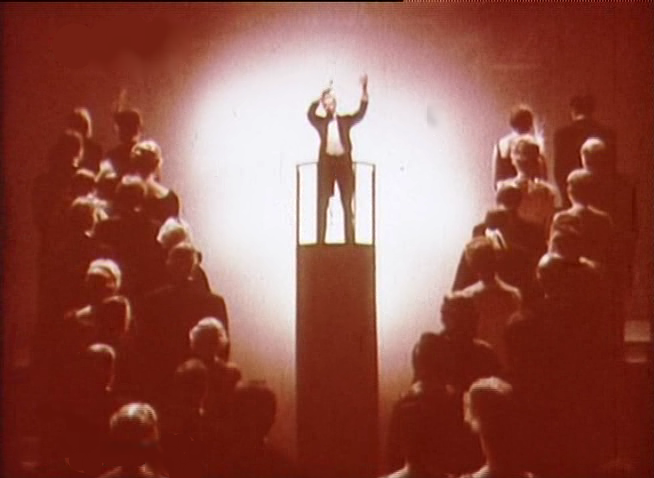
One of filmmaker Ken Russell's misfortunes is that while his work is always appreciated, it's always his early work. When he was first making a splash with features in the seventies, British critics howled in outrage, often pointing back to his early BBC work, praising it, and using it as a stick to thrash the new upstart movies like The Music Lovers and The Devils. By the eighties, some of that early work was getting the praise it had originally deserved, but Russell's US films, Altered States and Crimes of Passion, were ridiculed, and his low-budget UK features, such as Gothic and The Lair of the White Worm, garnered mainly contempt. Now even those oddities are redeemed, but nobody has much time for Russell's most recent output, productions shot in his garden shed with a camcorder. Their time will come...
What's overlooked, simply because it's been impossible to look at, is Dance of the Seven Veils—"a comic strip on the life of Richard Strauss in seven episodes." One of Russell's later BBC films, made when he was already a star of the cinema and was thus afforded greater latitude than had been the case when he worked for Huw Weldon at Monitor, the BBC's flagship arts show, this one hour extravaganza very much looks forward to the delirious excesses of The Devils and Lisztomania.
But we can't see it. Or at least, we can only see a faded, pink copy with bleary sound, smuggled on VHS from the BBC archives and illicitly uploaded online as an AVI. Because the Strauss estate took exception to Russell's comic strip, which deals, among other things, with the composer's relationship with the Nazi party in the 30s. When Russell looked back on his career in a 1990s TV documentary, the only way he could even show a clip from this film is by changing the music.

Russell credited the BBC, not so much with courage, as with a charming gullibility to be hoodwinked by a filmmaker like himself. Any feature film on Strauss would have to be vetted by the lawyers, but the BBC simply turned Russell loose, assuming all would be well. The resulting "comic strip" could be seen as unfair to Strauss...but Strauss is dead. The way to defend his reputation would be to screen the film and debate it.
Nympho nuns? Check. Surreal juxtapositions? Check. Lake District scenery? Check. Naked ladies? Check. The Russell obsessions are out in force here, and filmed with the sweatily intense blending of styles that marks him out as his own man, even if he wears his influences on his sleeve: Fellini, Lang, Welles. With wide angle lens he styles teetering, expressionistic compositions. His hand-held camera thrusts into the action like a heat-seeking phallus. Gliding dolly shots alternate with periods of frenzied montage. Russell has likened his approach to "kicking the audience in the balls and telling them something," with the obvious setback that sometimes the audience, doubled up on the floor, is in no mood to listen. In this movie, to use Billy Wilder's memorable phrase, he gives it both knees.
Did Strauss order his orchestra to play louder to drown out the screams of Jewish audience members being mutilated by jackbooted persecutors? I rather doubt it, but Russell's scene is an effective analogy: the artist who claims to be above politics is effectively doing just that. Russell's political side, like 90% of his myriad facets, is often overlooked, but The Devils is certainly a parable on power and corruption (it's not bad things that become corrupt: it's good things).
Russell's composer films draw flack because they venerate and rejoice in the music while frequently ridiculing or exposing the foibles of the artists themselves. Dance of the Seven Veils is possibly Russell's most savage attack on a composer (apart from possibly his treatment of Wagner in Lisztomania, seen as Dracula, building a Nazi Frankenstein monster), but this film is not lacking in nuance, if one can speak of nuance in a movie where a troupe of critics are murdered with trombones (here, at least, Russell may be partly in sympathy with Strauss) and the composer has sex with his wife surrounded by a full orchestra. Russell paints Strauss as naive, hypocritical, sometimes well-meaning, arrogant, confused, talented, genuine in his pacifism, false in his claims to have kept the Nazis at a distance (cue shot of Hitler riding on Strauss's shoulders while both play violins) and generally complex, at least for a comic strip character.
Actor/dancer Christopher Gable, one of several Russell regulars in the show, plays Strauss with a caricature German accent and manner, but really comes into his own in long shot: this is one of the few Russell films where Gable really gets to dance, and he makes the whole film a ballet. Another dancer, Vladek Sheybal (the Fiddler on the Roof himself!) plays Goebbels. A funny thing about Goebbels: he always works in movies. There have been bad Hitlers, but never a bad Goebbels. Goebbels always works. Why is that?

Dance of the Seven Veils has faded to pink. Let someone rescue it before even the pink disappears.
***
The Forgotten is a regular Thursday column by David Cairns, author of Shadowplay.